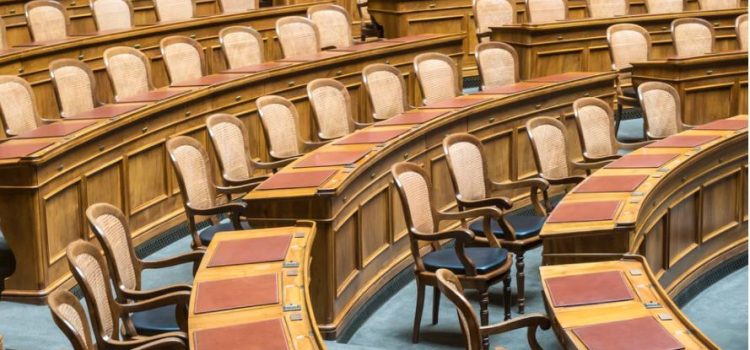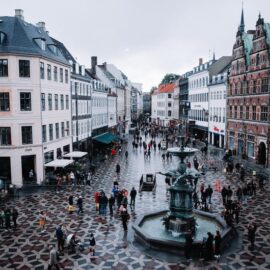

This article is an excerpt from the Shortform book guide to "Thank You for Being Late" by Thomas L. Friedman. Shortform has the world's best summaries and analyses of books you should be reading.
Like this article? Sign up for a free trial here .
What’s the current state of geopolitics in the world? How has the global geopolitical arena changed over the years?
Before globalization fully took hold, maintaining geopolitical stability was about armed forces, nuclear weapons, and regulation of weapons—essentially, conventional military power. Today, conventional military power still matters, but global stability also requires taking into account the three accelerations.
In this article, we’ll discuss the history of geopolitics, its current state, and what we can do to adapt to the upcoming changes.
Historical Geopolitics
Before we can discuss the state of geopolitics today, we need to cover a brief history of geopolitics. After World War I, nations fell and new ones rose, for example, the Austro-Hungarian Empire became Yugoslavia, Hungary, Austria, and Czechoslovakia and after World War II, many nations, such as India and Senegal, gained their independence from colonizers. In between World War II and the fall of the Berlin Wall, the geopolitical arena was fairly stable.
Average Nations
Most of the new nations didn’t have the resources to create strong governments or industries. However, at this period in time, they didn’t need to be strong, just average. The internet didn’t exist yet, so people couldn’t compare their situations with those of others around the world, automation wasn’t a threat yet, and China was keeping to itself and wasn’t competing for low-wage jobs. Most countries hadn’t used up all their natural resources and climate change hadn’t yet affected agriculture. Most countries also had young populations thanks to decreased child mortality and better health care, so pensions weren’t an economic burden yet either.
Additionally, there was plenty of help. During the Cold War, the major geopolitical conflict was between two superpowers, the US and the Soviet Union, and both nations needed allies. Both the US and the Soviet Union provided new nations with money to build infrastructure, leadership training, and citizen education. If funding wasn’t enough to secure an allyship, the US or the Soviet Union would put people on the ground. For example, the Soviet Union rebuilt Syria’s army several times.
During this period of time, US foreign policy was easy—the goal was simply to not let Russia take over. While the US and the Soviet Union were technically at war, both had reasonable leaders who were in communication with each other and kept each other in check. Both had enough nuclear power to destroy each other, so neither wanted to start a war because it would result in mutually assured destruction.
Post-Cold War
In between the Cold War and the early 2000s, Russia lost its superpower status and more nations gained independence, such as Ukraine and Kazakhstan, and America became the single superpower. The major geopolitical conflict was between the US and the rest of the world. As there were no wars going on, foreign policy was mainly the US involving itself with the governance of other countries.
After the failure of the US intervention in Afghanistan and Iraq and after the 2008 recession, the US lost power and confidence and pulled out of the Middle East. This resulted in two things: The rise of ISIS and the migration of refugees from ISIS states. The migration caused fear of immigration in Europe.
Current State of Geopolitics
Today, conventional military power still matters, but global stability also requires taking into account the three accelerations. Threats are no longer obviously galvanizing (for example, in the way Nazism galvanized the Western world to oppose it) and can’t be solved simply with armies and a conclusive victory on a particular date. The US and European countries don’t have the resources to go into other countries anymore, and they also don’t have the resources to handle people from other countries coming in.
US Foreign Policy
US foreign policy used to be easy—contain one other superpower, Russia—but in the age of accelerations it’s far more complicated and has three major arms:
Arm #1: Manage Superpowers
Today, there are three superpowers, the US, Russia, and China, and dealings with superpowers are no longer simply about containment and recruiting allies. The world is so interconnected now that the fall of other superpowers might actually be more dangerous for the US than the rise, and allies can quickly become enemies.
- Example #1: China has a huge effect on the world’s economy. If China collapsed, there could be a global recession.
- Example #2: The EU is an American ally regarding democratic capitalism and helps the US stabilize the globe. However, when member nations such as Great Britain cause instability (Brexit), that instability might have a larger effect on the EU (and therefore the US) than any attack China or Russia could launch.
Arm #2: Stabilize the Globe
In addition to superpowers, US foreign policy must manage state failure, which is the fall of governments and the takeover of countries by tribes, gangs, and extremist groups. Weak states in the Middle East and Africa are causing regions of disorder, and this disorder is spilling into more stable nations as migrants and refugees travel from weak states to Europe or the US.
- For example, thousands of young male migrants from various parts of Africa, which is disordered, meet in Agadez, Niger. On Monday evenings, they pile into trucks to travel through Libya (which is war-ravaged) and hopefully on to Europe, a more ordered part of the world, to find jobs. Neither Libya nor Europe wants to let most of the migrants in.
Arm #3: Contain Breakers
The final arm US foreign policy must address is containing breakers. Breakers are individuals or groups who want to cause chaos. (Friedman contrasts breakers with “makers,” people who use the accelerations to build new things or improve old things.)
Pre-acceleration, new technologies were first available to governments and it took some time for them to make their way into the hands of the general public, but now, it’s easy to get destructive technology or find out how to build it online. A single person now has the ability to compete with superpowers and unlike superpowers, breakers often can’t be deterred by mutually assured destruction—some breakers are happy to commit suicide if it means hurting others too.
- Example #1: It’s now easy to source inexpensive bomb-making materials online. It only costs $100 to make an IED, a simple bomb. As of 2013, IEDs killed over 3,000 Americans in Afghanistan and Iraq, and the US government spent $75 billion on anti-IED measures.
- Example #2: In 2016, cybercriminals took over the computers in a hospital in LA and blackmailed the hospital into paying them in order to get their computers back. Pre-acceleration, it was easy to catch extorters—put a tracker in the bag of ransom money. These hospital cybercriminals, however, asked to be paid in bitcoin, which is hard to trace. (Shortform note: As of 2020, the criminals were still at large.)
Additionally, single breakers are far harder to identify, predict, and take down than an organization. When a government is dealing with a terrorist organization, the strategy is to find the organization, disrupt it, and destroy it. Individual people are harder to keep track of and they can come out of nowhere. The rise of breakers is part of why radical Islamism is so persistent—it’s not an organization, it’s a movement. There’s no leadership structure, so taking out certain people doesn’t have a major effect on the movement.
Weak Nations
In the age of accelerations, average nations become weak nations for several reasons:
- Lack of foreign aid. Superpowers no longer need allies so badly and have less motivation to support other countries who relied on their aid. If powers want something from another country, it’s easier to get it in other ways, for example, by importing labor and goods.
- Increased political instability. Increased connectivity makes it easier to destabilize politics—people can compare what they have to what others have, and the supernova makes it easy to communicate and organize. (More on connectivity in the next section.)
- For example, the supernova allows extremists to access desperate people who might be persuaded to join their organizations.
- Foreign interference. Many average countries had their borders drawn by colonial and imperial powers, so the borders don’t necessarily represent areas that have natural communities or things in common. Additionally, the US government has intentionally destabilized certain governments, such as Libya’s and Iraq’s, for their own ends.
- Loss of jobs. Some jobs currently done internationally may return to Europe or America. In recent years, whoever could make things cheapest dominated. In upcoming years, because energy is cheaper than it used to be in the US and technology has advanced, more products might be made locally. Additionally, low-wage jobs are being taken by robots or people in Vietnam or China.
- Slowed growth in China. China’s slowing growth affects many other countries. China used to import a lot of raw materials from other countries, so as its imports slow, this affects all the other countries it bought from. Additionally, China has less money to spend on foreign aid.
- Fall of oil prices. Many average nations’ main industry is oil, so when the price of oil falls, their economies are depressed.
- Climate change. Climate change is making agriculture more precarious because crops need certain conditions to grow. Many average nations’ main industry is agriculture, so when climate change negatively affects agriculture, their economies are depressed and the local food supply dwindles.
- Population explosion. Increasingly large populations exacerbate much of the above. For example, there’s even more competition for jobs among a larger population.
Madagascar is an example of a previously average nation that became weak in the age of accelerations. During the Cold War, Madagascar received a lot of foreign aid—for example, the US built a NASA station, Cuba sent teachers, and North Korea built a Presidential Palace. Now, most of this aid has dried up, the population has exploded, cyclones have destroyed infrastructure, the island’s topsoil is eroding, and education is only mandatory until age fifteen and taught in the local language, so it’s difficult for people to connect to global flows.
It’s always hard to come back from disorder, but it’s especially hard in the age of accelerations because a country can much more quickly get far behind, and there’s so much to do to catch up and keep up—set up flow access, lifelong learning, infrastructure, and innovation.
Connectivity and Geopolitics
As we learned earlier, to maintain global stability, we need to take the three accelerations into account. In this chapter, the author specifically focuses on the role of connectivity and geopolitics—connectivity and the supernova have the potential to both free people from oppression and create political instability.
There are two types of freedom:
Type #1: “Freedom from” is liberation from oppression such as dictators, consumerism, and anything you’re forced to do against your will. This type of freedom is easier to create—you just need to break the current system.
- For example, in Egypt, President Hosni Mubarak resigned after protests that were organized on social media.
Type #2: “Freedom to” is the ability to do things you want to. This type of freedom is harder to create—not only do you need to escape the current system, but you also have to build a new one that will support you in doing what you want.
- After President Mubarak fell, the population became polarized because social media was used to spread rumors and hate speech. The Muslim Brotherhood and then the army took power. Some of the original protestors were arrested and their vision never played out.
Connectivity is an aid to “freedom from” and a deterrent to “freedom to.” Social media, cell phones, and other forms of digital communication excel at putting large groups of people in touch with each other quickly and give everyone a voice, and this group effort can topple existing systems. However, digital connection doesn’t provide any opportunity for debate, help people to trust each other, unite organizations, or create strong leadership, all of which are needed to create a new system.
Wael Ghonim, who created the anonymous Facebook page that helped start the Egyptian revolution, sees five limitations to using social media for political ends:
- Rumors. It’s fast and easy to spread misinformation via social media, particularly when people are inclined to believe rumors that confirm their existing biases.
- Echo chambers. On social media, it’s easy to connect only with people who agree with you. You can ignore or block anyone who doesn’t.
- Devolution. Online discussions can get vicious quickly. People write things online that they would never say to someone in person.
- Unwillingness to change. Social media moves so quickly that there’s no time for reflection, so people post quickly and instinctively about complicated issues. And once a post is online and attached to your name, you’re inclined to defend it rather than reflecting on it, even if you learn new information about the subject.
- Talking at vs. talking to. Social media is set up for broadcasting, not engaging.
These limitations are partly due to the existence of cyberbullying and trolls, but also partly due to the design of social media. Social media platforms are currently set up so that writing inflammatory posts gets you more attention. If the platforms were changed to promote thoughtful reflection, social media might not be so polarized and destabilizing.
Adapting
In these accelerating times, we need to rethink geopolitics. The days of occupation and aggressive foreign aid are over and the US can’t come in from the outside and change things—countries will have to make changes themselves. The US can support these countries by using a three-step process: 1) amplify, 2) deter, and 3) degrade.
Step #1: Amplify
Amplifying is giving people educational opportunities and economic opportunities, both of which allow people to stay in their countries instead of migrating in search of resources or work.
In terms of educational opportunities, education is empowering and allows youth to make changes to their countries. Educated youth can use their knowledge of history and human rights to call their governments on inappropriate action, and youth who get an American-style education can compete with anyone in the world.
- For example, after the Arab Awakening, the US gave Lebanese students $13.5 million worth of local college scholarships. At college, they learned about tolerance, critical thinking, and social and gender equality, all of which will help bring stability to the region.
In terms of economic opportunities, the author lists three specific initiatives:
- Encourage people to breed chickens. Chickens are cheap and easy to take care of—they only need a few vaccines, some shelter, and ideally food, but they can fend for themselves if you can’t feed them. They reproduce within a few months, and you can either eat them or sell them. Additionally, many cultures see chickens as a woman’s animal, so having chickens is an opportunity for women to make their own money.
- Combat desertification. African leaders came up with the idea to plant a wall of trees along the border of the Sahara desert. The trees will stop the desert from spreading and restore agricultural land that’s been ravaged by climate change. Monique Barbut, who works with the UN, proposes that one person per village in 13 countries be trained to plant trees and then paid to take care of the trees. Then, everyone else can work the land that the trees have restored.
- Connect everyone to the internet. This would allow people in poor communities to have access to education and other flows that would give them the ability to make money where they are.
Step #2: Deter
Deterring is the US maintaining enough power to stop countries from acting in ways the US doesn’t want them to. For example, the US needs to maintain its nuclear power so that other countries, especially Russia, China, and North Korea, won’t use theirs.
Russia benefits from small amounts of instability because it’s a petro-state and oil prices are always high in times of instability. Russia has embraced the three accelerations and uses technology particularly to create instability. For example, Russian hackers broke into Democratic Party computers to influence US elections.
China, on the other hand, benefits more from stability because China exports products globally and trades with the US economy. China only works at dominating nearby countries.
While the US has to deter Russia and China, all three countries have to work together regularly against greater evils—breakers and large-scale disorder are bad for all three powers. This leaves the US in some awkward situations. For example, to deal with instability in Syria, would it be better to remove the Syrian president from power and cause short-term disorder (which Iran and Russia wouldn’t support), or would it be better to take out ISIS (which Iran and Russia would support) and leave a murderous ruler in place but maintain order? There’s often no good solution, but the US has to do its best to deter.
Step #3: Degrade
Breakers can’t be deterred because they’re not scared of superpowers. Breakers come from weak states that can’t keep up with the accelerations, and young people in these states, especially men, face humiliation—they’ve never had money, a job, or a romantic relationship. These young people are susceptible to jihadist-Islamist organizations who promise them money or rewards in the afterlife.
However, breakers can be degraded. Degradation means delegitimizing chaos-causing action and cutting breakers off from their leaders. Degradation must come from people in breakers’ communities—who will notice when they’re behaving erratically and shame them—and their nations. According to strategist George Friedman, the only solution to Islamist terrorism is for Muslim states and other strands of Islam to fight the jihadists. The US can only help by providing military assistance.

———End of Preview———
Like what you just read? Read the rest of the world's best book summary and analysis of Thomas L. Friedman's "Thank You for Being Late" at Shortform .
Here's what you'll find in our full Thank You for Being Late summary :
- The problems that arise when the world changes faster than humanity can adapt
- How to adapt to technology, globalization, and climate change
- The importance of taking time to reflect and reorient






